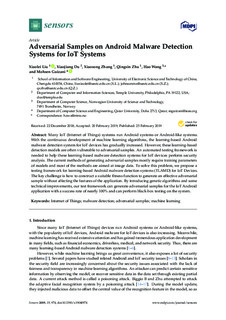Adversarial Samples on Android Malware Detection Systems for IoT Systems
Journal article, Peer reviewed
Published version

Åpne
Permanent lenke
http://hdl.handle.net/11250/2590249Utgivelsesdato
2019Metadata
Vis full innførselSamlinger
Originalversjon
10.3390/s19040974Sammendrag
any IoT (Internet of Things) systems run Android systems or Android-like systems. With the continuous development of machine learning algorithms, the learning-based Android malware detection system for IoT devices has gradually increased. However, these learning-based detection models are often vulnerable to adversarial samples. An automated testing framework is needed to help these learning-based malware detection systems for IoT devices perform security analysis. The current methods of generating adversarial samples mostly require training parameters of models and most of the methods are aimed at image data. To solve this problem, we propose a testing framework for learning-based Android malware detection systems (TLAMD) for IoT Devices. The key challenge is how to construct a suitable fitness function to generate an effective adversarial sample without affecting the features of the application. By introducing genetic algorithms and some technical improvements, our test framework can generate adversarial samples for the IoT Android application with a success rate of nearly 100% and can perform black-box testing on the system.
